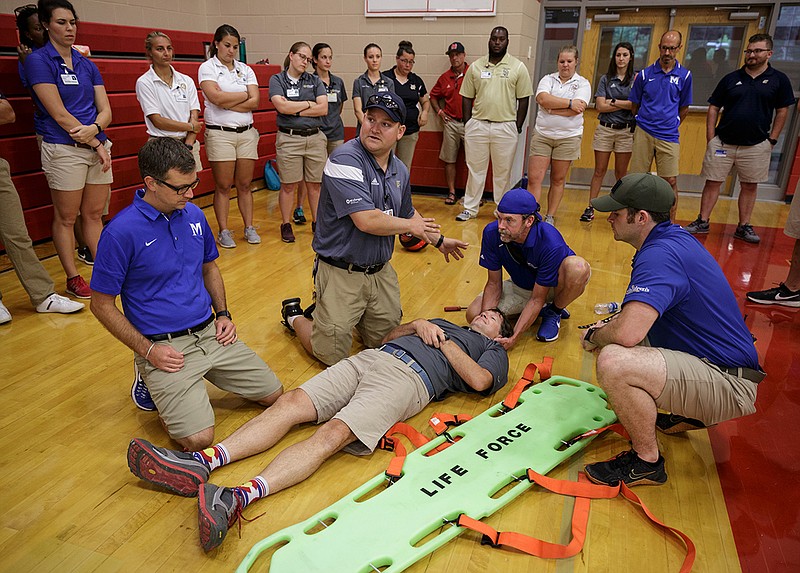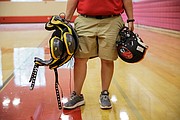Hamilton County Schools' new team of athletic trainers is gearing up for the start of school in two weeks, rehearsing spine injury protocol and other medical emergencies.
In April, the school board approved a contract with Erlanger Health System to place full-time, certified athletic trainers in every high school in the district.
East Ridge High was one of the schools left to fend for itself without an athletic trainer before the new contract.
"I now have a trained professional that understands sports-related injuries," said Tim James, head football coach at East Ridge High. "We can focus more on the Xs, Os, the kids and the coaching, as opposed to trying to be a pseudo athletic trainer."
On Friday, Kevin Gebicke, a paramedic for Erlanger Lifeforce Event Medicine, provided a refresher course on how to safely transfer players with suspected neck or spinal cord injuries from the ground to a board and ready them for transport by emergency responders.
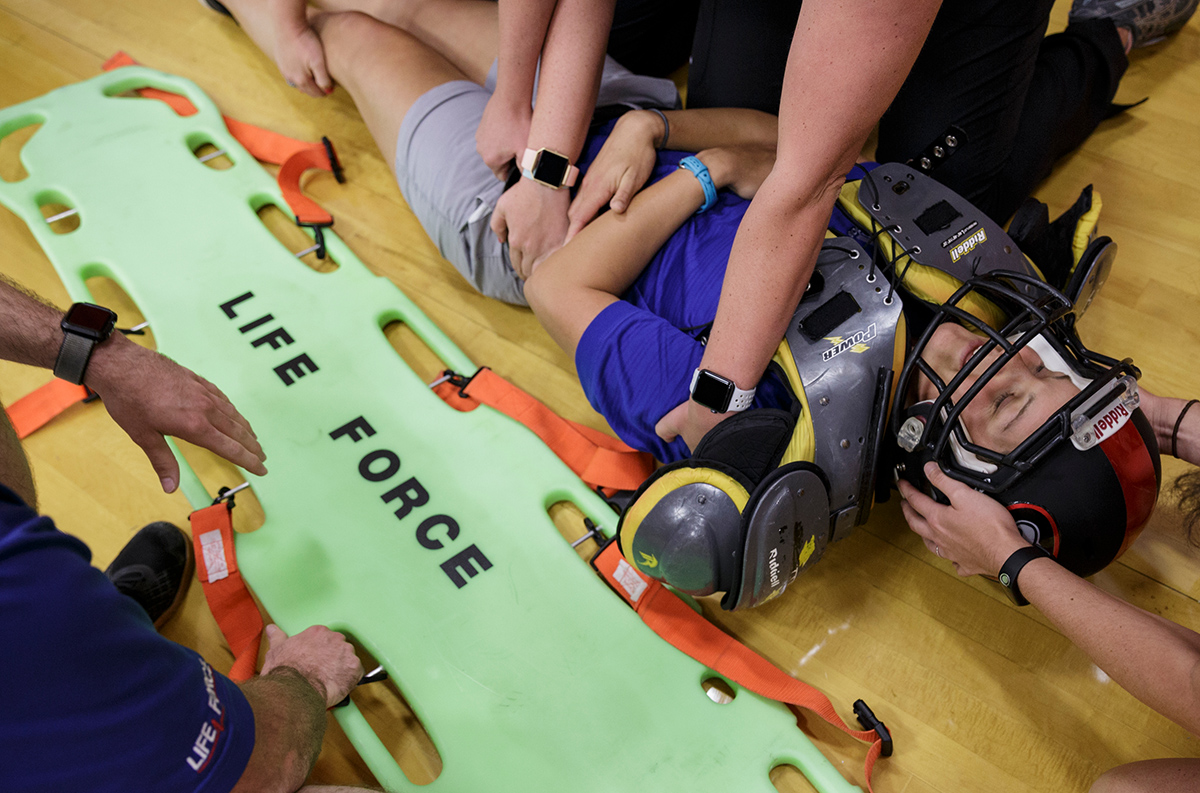 Volunteer patient Laura Curtis is moved onto a backboard during Chattanooga State Technical Community College's Tennessee College of Applied Technology commencement ceremony at Abba's House on Friday, July 27, 2018, in Chattanooga, Tenn. Many of TCAT's graduates are part of Gov. Haslam's Drive to 55 initiative, which aims to increase the number of Tennesseeans with post-secondary educations to 55 percent by 2025.
Volunteer patient Laura Curtis is moved onto a backboard during Chattanooga State Technical Community College's Tennessee College of Applied Technology commencement ceremony at Abba's House on Friday, July 27, 2018, in Chattanooga, Tenn. Many of TCAT's graduates are part of Gov. Haslam's Drive to 55 initiative, which aims to increase the number of Tennesseeans with post-secondary educations to 55 percent by 2025."To protect that person from further injury, that's where spinal immobilization comes in," Gebicke said. "They could have a fracture to their back resulting in damage to their spinal cord, which could result in temporary or long-term paralysis."
He emphasized "neutral alignment," keeping the head and neck straight and in line with the body, when moving the players.
"Making sure that person at the head is calling that movement and we're working as a team, that is probably the most key aspect," he said.
Although Friday's training at Signal Mountain Middle High School was geared toward football players, the same technique applies to all spine injuries, but in football, trainers must also take the helmet and pads into consideration.
"The only time we're going to remove that equipment in the field is if they were having a life-threatening emergency requiring CPR," he said.
When a serious injury occurs in a remote part of the county, like Signal Mountain, Lifeforce helicopters are poised to quickly transport the student.
"If somebody has a suspected spine injury, that's a pretty serious injury," Gebicke said. "Getting them to those super specially trained neuro and spine surgeons is really key, and the faster we can do that is always better."
Although some schools already had arrangements with other sports medicine providers, board member Joe Wingate, District 7, said the move would bring much-needed fairness and consistency to the athletics programs.
Dr. Bill Moore Smith, medical director of Erlanger sports medicine, agreed.
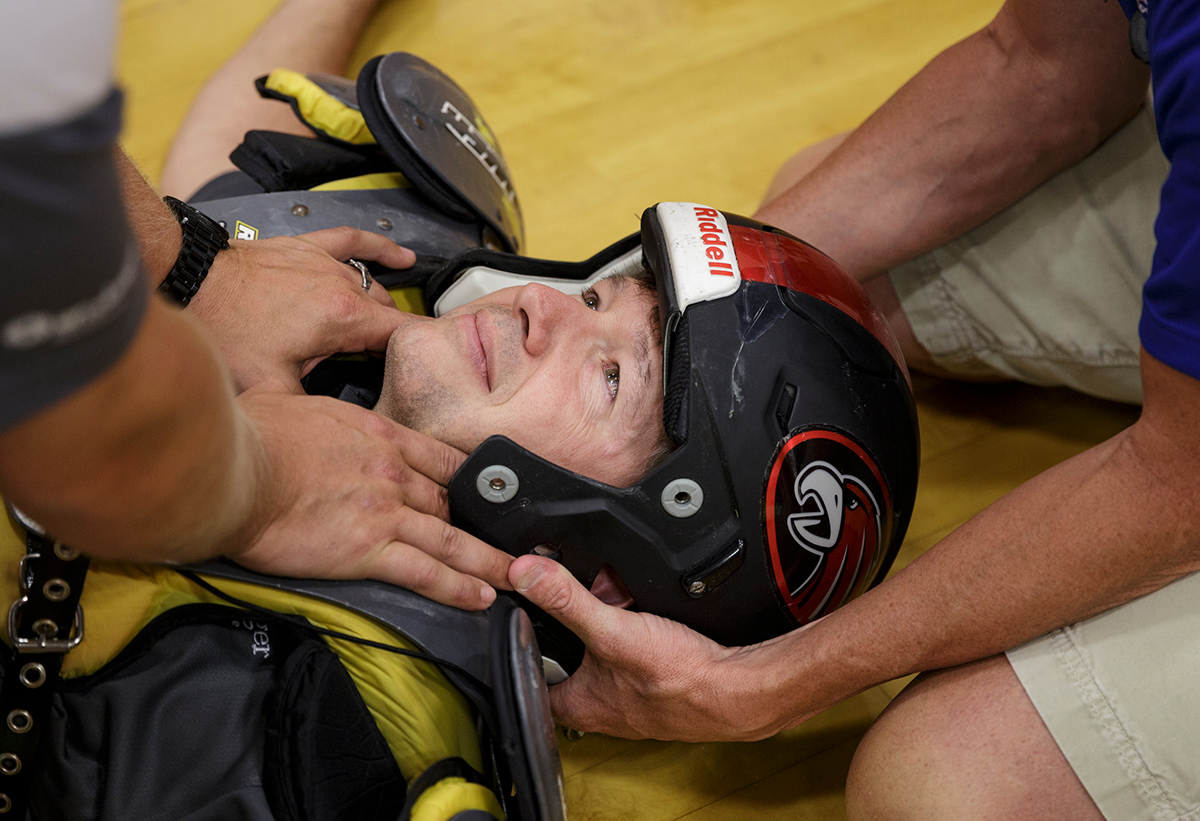 Paramedics secure Dr. John Dorizas's neck as his helmet is removed while volunteering as a patient during a backboard-immobilization workshop hosted by Erlanger Hospital at Signal Mountain Middle High School on Friday, July 27, 2018, in Signal Mountain, Tenn. Athletic trainers with area high schools got hands-on training on how to properly move an injured athlete onto a backboard for transport.
Paramedics secure Dr. John Dorizas's neck as his helmet is removed while volunteering as a patient during a backboard-immobilization workshop hosted by Erlanger Hospital at Signal Mountain Middle High School on Friday, July 27, 2018, in Signal Mountain, Tenn. Athletic trainers with area high schools got hands-on training on how to properly move an injured athlete onto a backboard for transport."For so many years, one program would come in and try to get the best schools but the ones that were unserved were the ones that really needed it," he said.
Students won't be charged for services, which could range from injury evaluation to joint taping, physical therapy and nutrition counseling.
"If it's an injury, they'll probably want to see a sports medicine physician, but trainers will provide all options to the parents," Smith said. "We're not trying to take patients away from an athlete's doctor. They always have the opportunity to go see their doctor."
Common injuries include sprained ankles, jammed fingers and shoulder strains, but more significant injuries, such as torn knee ligaments and broken collar bones, also happen, James said.
"I'm not going to dare put a kid in with some type of suspected, more serious injury, and it probably kept some kids from playing in the past," he said.
Heat stroke is another concern, since the season starts earlier and today's teens spend less time outdoors than when James played ball.
"I think the sport has, in the past 25 years, begun to really take heed of the medical warnings," he said. "When I played, it was kind of a shake-it-off mentality. I'm sure we had a lot of injuries that we played through that probably did some permanent damage."
Cortney Braswell, the head football coach at Ridgeland High School who has played and coached football across the region for more than a decade, said the new athletic trainers are a welcome sight. He said even experienced coaches aren't equipped to handle certain injuries.
"There's nothing worse than, as a coach on the sideline, [having a player] go down and you not know how to deal with that," Braswell said. "Anytime a kid goes down, you always kind of hold your breath. At that point, it's not even about return to play. It's about quality of life. You want to make sure kids are OK and able to do things beyond sports."
Contact staff writer Elizabeth Fite at efite@timesfreepress.com or 423-757-6673.
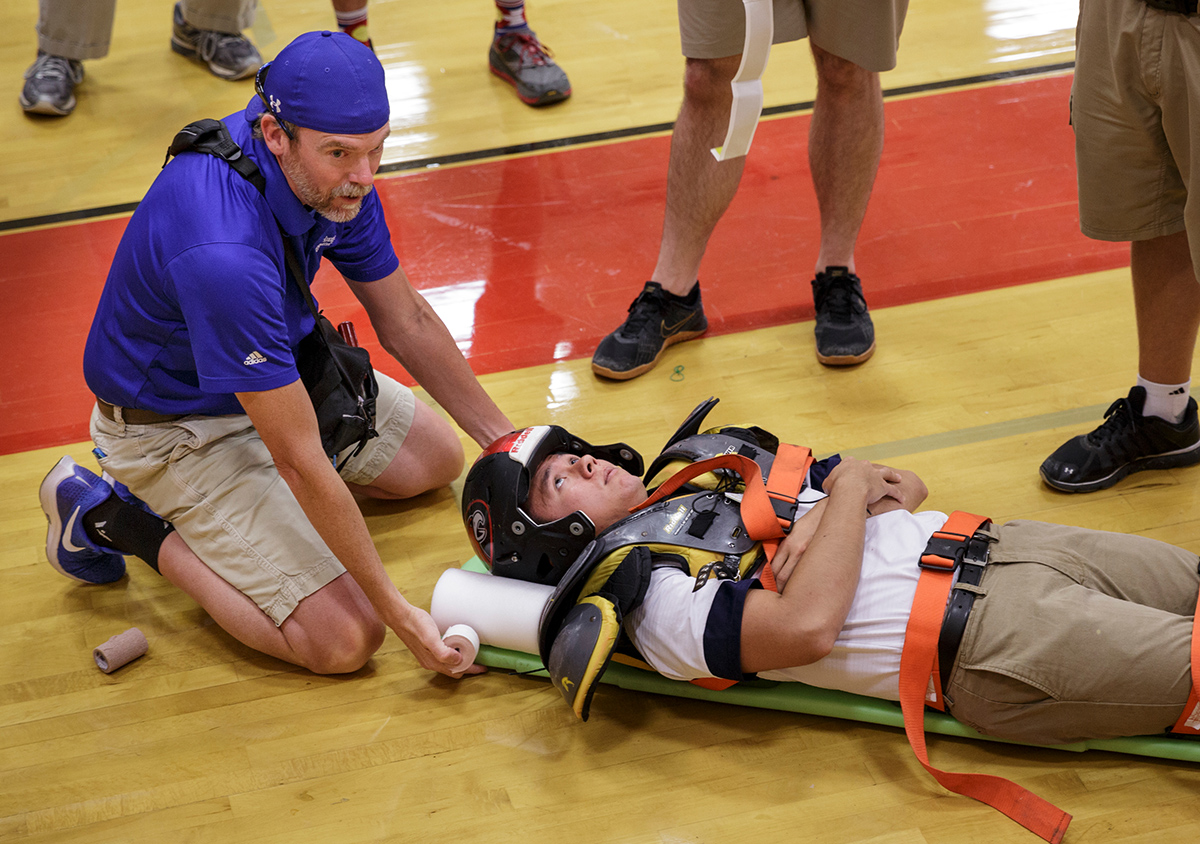 Steve Carpenter, left, talks about head immobilization as Damon Sowers volunteers as a patient during a backboard-immobilization workshop hosted by Erlanger Hospital at Signal Mountain Middle High School on Friday, July 27, 2018, in Signal Mountain, Tenn. Athletic trainers with area high schools got hands-on training on how to properly move an injured athlete onto a backboard for transport.
Steve Carpenter, left, talks about head immobilization as Damon Sowers volunteers as a patient during a backboard-immobilization workshop hosted by Erlanger Hospital at Signal Mountain Middle High School on Friday, July 27, 2018, in Signal Mountain, Tenn. Athletic trainers with area high schools got hands-on training on how to properly move an injured athlete onto a backboard for transport.